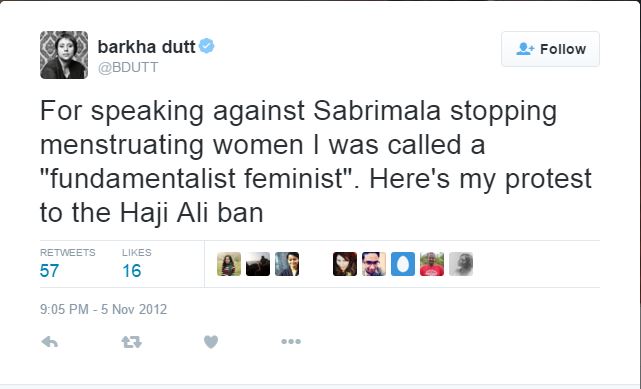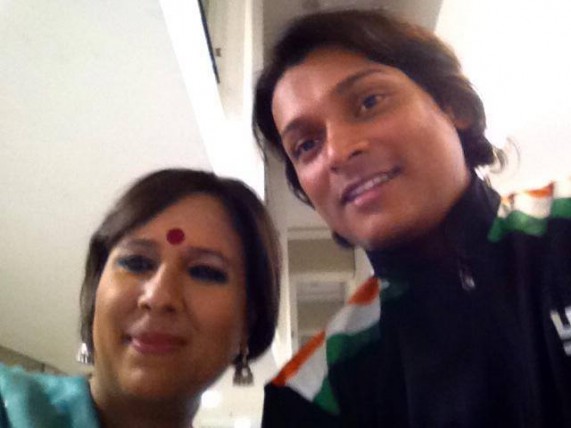Does Call For Equal Rights of Temple Entry Make One ‘Fundamentalist Feminist’?
Rahul Easwar, who is a self professed activist and spokesperson of Hindu ideology, reaffirmed his stand on why he has been calling television journalist and author Barkha Dutt a ‘fundamentalist feminist’ when asked if she was correct in quoting the slur in one of her recent publications.

He had made the comment against her multiple times on air and still maintains the opinion in view of her ‘extreme’ and ‘needless’ efforts to assert women’s rights in almost every matter that is too concerning for the adherents of customary practices hailing from diverse religious backgrounds of the land.
In her book ‘This Unquiet Land: Stories from India’s Fault Lines’, Barkha has made a passing reference about Easwar’s comment while speaking about the blanket ban on women entering the shrine of Hindu deity in Sabarimala in Kerala. Previously, she had faced fury of netizens and television viewers for questioning the logic behind ban of menstruating women entering temples across the country.
“She is a great friend, but we are ideological opposites. I believe that she is unnecessarily looking through a female prism in this matter. Once for fun I said that we men do not have a ‘Barkha Dutt’. Any idea taken to an extreme form is called fundamentalism and I believe Barkha Ji is a fundamentalist feminist in that case,” Rahul Easwar told Folomojo.

The young Hindu diehard, who is also the son of former priest in Sabarimala, opines that Barkha Dutt enjoys an impractical ‘twentieth century Marxian hangover’ as to not find the difference between men and women when it comes to customs and practices of the land. Finding himself to be in the ‘right wing’, he observes that men’s Sabarimala is not women’s Sabarimala. Rahul in a bid to justify the practice at Sabarimala, reflects light on the customary practice at Attukal Devi temple in Thiruvananthapuram (which is also known as Women’s Sabarimala), where men are not allowed to offer ‘Pongal’ to the deity.
“There is a Sabarimala for men and there is a Sabarimala for women. And there is no discrimination but there is differentiation. Holy rituals in Sabarimala are more associated with male traits, meanwhile, rituals offered in Attukal have female traits. In another case, I cannot go ask if I can participate in a ‘Kanyaka Pooja’ in Chakkulathukavu, because doing so will defeat the whole purpose of the pooja,” he went on to say.
Still it is quite ironical that despite all the justifications for classifying worship places on basis of gender, no female priests are to be found in any of these temples. However, Rahul feels that feminists including Barkha Dutt are blowing up the issue by looking at the temple restrictions through a prism which is forged using western homogenous outlooks and secular atheistic ideologies
In a television show hosted by Barkha Dutt broadcast in 2012, Rahul clinged on to the verses from ‘Manusmriti’ which according to him instructed to respect women by giving all superiority to her. However, he refused to accept the idea of shredding the ban on women entering Sabarimala shrine.
Leaving conservatives rattled, in last December a group of women activists approached the Supreme Court to revoke the provisions of laws such as Kerala Hindu Places of Public Worship (Authorization of Entry) Rules, 1956 which prohibit women from entering certain Hindu worship places in the country.
“We have Siva and Sathi, we have Ardhanarishwara. They (petitioners) believe in feminism but we believe in ‘womanism’. It is also evident that highest order of left wing socialists are behind the initiation of such a case. We respectfully disagree with the idea,” he added.
As the purity of women entering the temples is in question, it would not be wrong to assess the purity of men who are privileged to enter to all religious shrines. Critics argue that such biasedness could be counted as blatant discrimination of gender because at least a fraction of the number of men who gain entry to temple shrines would be part of activities which the religion considers as unholy.
Also Read;

OMG-inducing, share-compelling, like-attracting, clutter-breaking, thought-provoking, myth-busting content from the country’s leading content curators. read on...
